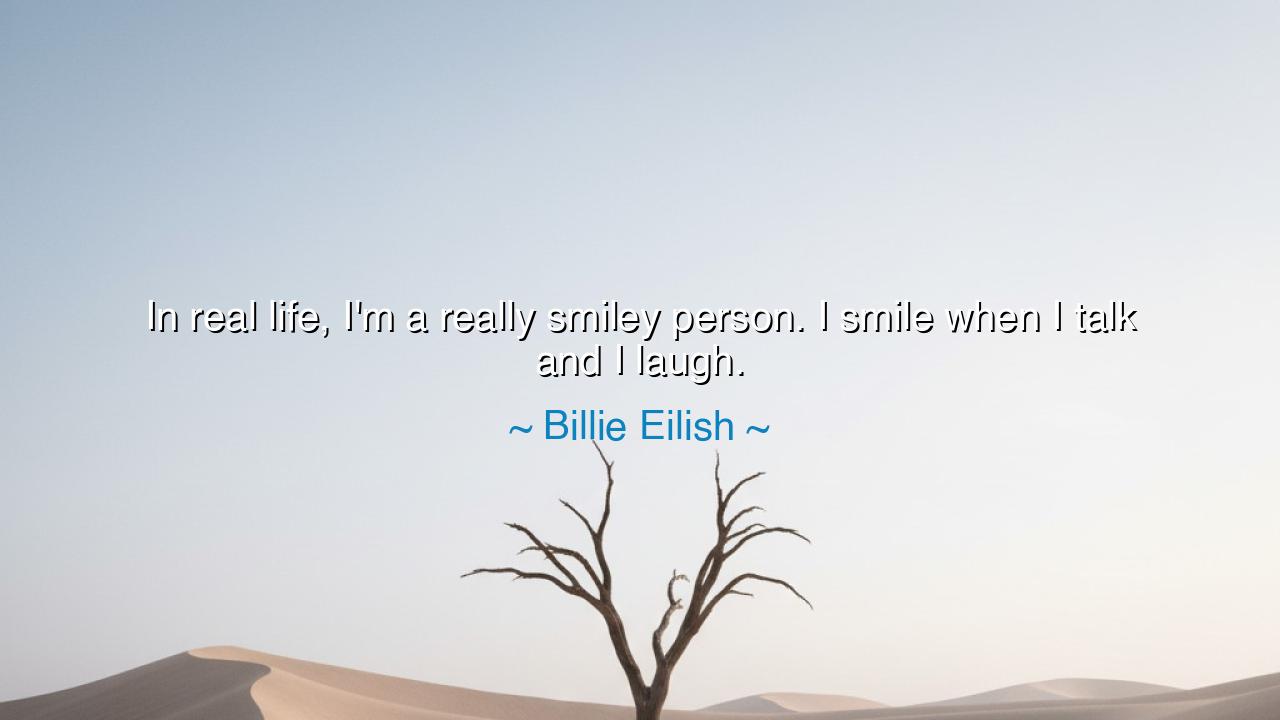
In real life, I'm a really smiley person. I smile when I talk and






Hearken to the words of Billie Eilish, who proclaimed with a disarming truth: “In real life, I’m a really smiley person. I smile when I talk and I laugh.” Though these words may seem light, like a feather borne on the wind, they conceal within them the gravity of an ancient secret—that joy is both shield and weapon, both gift to the self and offering to the world. To smile is not merely to move the lips, nor to laugh merely to release sound; it is to proclaim to the universe, “I choose light over shadow, I choose hope over despair.”
For in every age, the sages have taught that the spirit is revealed through its countenance. A frown is a cloud that veils the soul, but a smile is a sun that bursts forth, casting rays of warmth upon others. In this saying, Eilish confesses not a performance for the stage, but her true nature—a soul inclined toward brightness. And though her art may often carry the shadows of sorrow, in her living she chooses the path of laughter, for even the nightingale must sing while surrounded by the darkness of the forest.
The ancients understood this power well. Recall the tale of the Stoic philosopher Epictetus, born a slave, who suffered hardship and the cruelty of chains. Yet he taught his followers to carry themselves with serenity, to face trials with the calm of a man smiling before the storm. He declared that while one cannot govern the world, one can govern the self—and often, the first step is as simple as a smile. Thus we see that even amidst suffering, the choice to laugh and to shine forth joy is an act of defiance against despair.
There is also the example of Mother Teresa, who walked the streets of Calcutta among the dying and the destitute. Surrounded by sorrow, she bore a face always softened with a smile. To each person she tended, she gave not only food or bandages but the healing balm of her laughter and kindness. She knew that to smile at another is to affirm their worth, to tell them without words: “You are seen. You matter. You are loved.” In her small gestures, she revealed a truth as mighty as the mountains—that the spirit’s brightness can heal more than medicine alone.
From this, we understand the deeper meaning of Billie’s words. To be a smiley person is not naivety, but wisdom; it is to guard one’s heart against bitterness by overflowing with joy. To laugh in the midst of conversation is not frivolity, but generosity, for it shares delight with others. A smile transforms a room, reshapes a gathering, and creates a current of ease that even the troubled can rest in. The one who smiles is not weaker but stronger, for they conquer the darkness within themselves first, and then radiate that victory outward.
The lesson, O seeker of truth, is clear: carry within you the light that can be seen upon your face. Let your smile be sincere, and your laughter unforced, for such things are the treasures of the heart. Do not hoard them, but give them freely, as one gives bread to the hungry or water to the thirsty. For the world is parched with sorrow, and even the smallest stream of joy can refresh it.
As for practical actions, strive each day to greet others with a smile, even when your burdens weigh heavy. Practice the art of laughter, not as denial of sorrow, but as the triumph of the spirit over it. In your conversations, season your words with warmth; in your gatherings, bring forth mirth as a host brings forth bread and wine. And when the days are long and weariness presses close, recall that a single smile has turned the course of battles, healed friendships, and restored hope to broken hearts.
Thus, let these words be carried forward: that the true strength of the soul is not always in its sternness, but often in its ability to smile and laugh, even when life presses with weight. For in choosing joy, you become a beacon to others, a torch in the darkness, a living reminder that though shadows fall, the sun forever rises.






AAdministratorAdministrator
Welcome, honored guests. Please leave a comment, we will respond soon